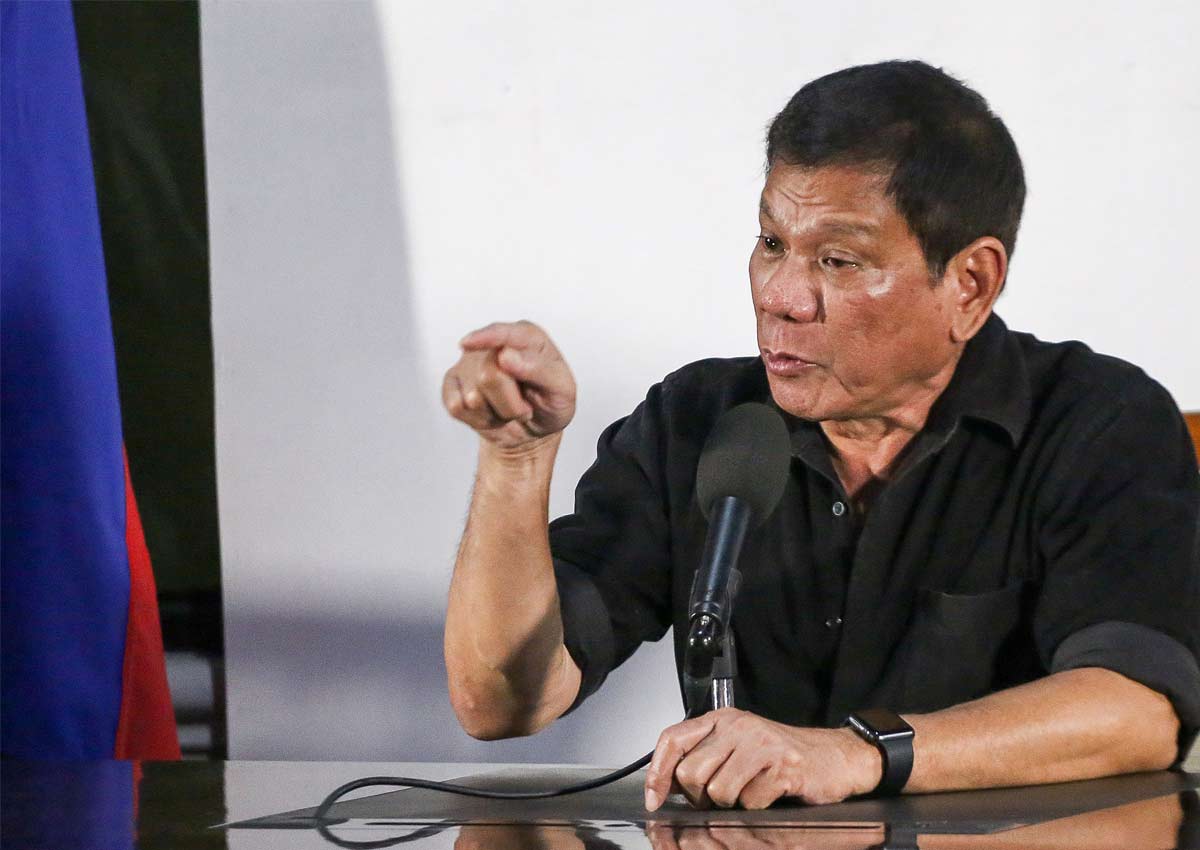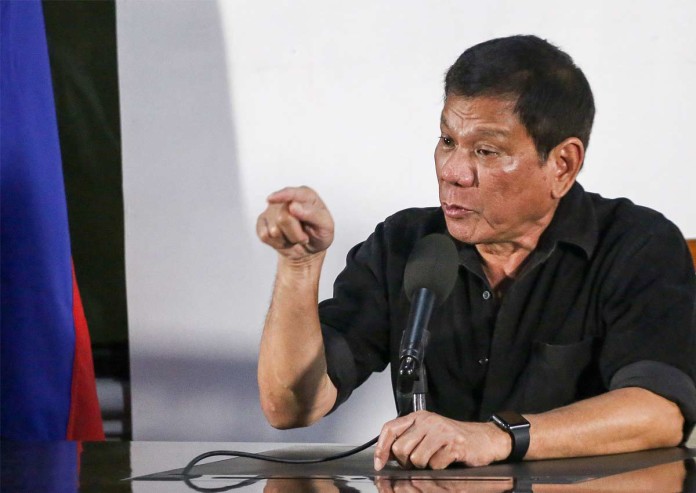DAVAO CITY, Philippines – “If you hit me, I will hit right back.”
President-elect Rodrigo Duterte served that warning on “paid hacks” and “lowlifes” in the media as he slammed the industry for employing crooked journalists.
In a 20-minute “rant” before taking questions from reporters on Thursday night, the foul-mouthed mayor of Davao City distinguished between the “crusaders” and the “extortionists” in the media, telling the journalists that he could do as much damage to them as they might do to him.
“I can spend the next six years of my presidency exposing you and attacking you. This is not a one-sided affair,” he said.
“There are politicians who would accept and swallow [your attacks]. Not me,” he added.
Duterte spoke after drawing condemnation from local and international media groups for saying on Tuesday that corrupt journalists were legitimate targets of assassination. The international journalists’ group Reporters Without Borders called for a boycott of Duterte’s press conferences.
About 175 journalists have been killed in the Philippines since 1986, making the country the second deadliest in the world for the press. “No apologies, no nothing,” Duterte said on Thursday. “I’m just telling you the terrain. No apologies. Bulls**t.”
“I am not getting back at you. I am challenging you,” Duterte said. “I can have my own website and attack you. All that I have to do is to research your life and the life of your children and I will just put it there. That’s how it is.”
Duterte said he was “willing to throw my last card” and “even lose the privilege before the inauguration” just to expose rogues in the media. “That’s why I said I can lose the presidency anytime. I can lose my life and honour anytime. That’s what I said. I will not die if I do not become President. So don’t f**k with me,” he said.
“If worst comes to worst, we will just expose each other. Go ahead, I’ll give you the names of journalists to whom I’ve given money. Do you want that?” he said.
Asked whether politicians like him who give in to demands of payoff were not part of the problem, Duterte made a distinction between legitimate “PR” (public relations) work and extortionist journalism.
Claiming he had long known how reporters worked throughout his public life, Duterte said there were three kinds of journalists in the Philippines: the crusaders who expose the truth and do not accept bribes, the publicists who work as “mouthpieces” of vested interests, and “the lowlifes” whose greed is unlimited.
Of the third kind, Duterte said “they abound.”
Vultures
“The vultures, pretending to be journalists… The problem here is, every son of a b**** who claims to be a journalist makes money out of it, extorting money, and he is killed and glorified because he is a journalist,” Duterte said.
“There’s always a paid hack. It’s not only in other professions. Do not ever think that you are in a field of purity,” he said.
Duterte decried the criticism he had drawn for calling on Tuesday Davao City journalist Jun Pala a “son of a b****” who deserved to die.
He described Pala, who was shot dead in 2003 by still unidentified assailants as a gun-toting “criminal through and through.”
Duterte said Pala once barged into a meeting of the broadcast regulatory body Kapisanan ng mga Brodkaster ng Pilipinas about calls to censure him “with an [M-16] and a group of goons and threatening to kill people.”
“And you say he’s a hero?” he said.
Duterte scoffed at Reporters Without Borders’ call for a boycott of his press conferences, even telling Manila reporters not to cover him. “I do not want publicity, you know that. It would be good if you just disappear,” he said.
He said, however, that he could not stop journalists from covering him. “If you want to stay, fine. I did not say you should leave or never come back. If you want to come back here to do a story, this is a free country,” he said.
Duterte also vented his ire on television stations, saying they were mostly after money, based on a personal experience with someone from the industry who had told him, “This is business.”
He also called certain news reports about him “garbage,” including stories about his alleged undeclared wealth made public by defeated vice presidential candidate Antonio Trillanes IV during the campaign.
“You see the garbage both in the networks and the newspapers. See the garbage that Trillanes was . . . around everybody? Well, of course it’s money,” Duterte said, without naming the media outfits.
The mayor slammed the media for employing people who had no respect for the ethics of journalism.
“You accept into your field people who do not even write straight sentences. They go to publishers, write anything, the proofreader will correct it, and he goes around asking for money,” he said.
He said he was just “telling the truth.”
“Do not ever think that I am here to beautify journalists. That’s not my business,” he said.
Wolf whistle
Duterte also defended himself from criticism for wolf-whistling at television reporter Mariz Umali in his press briefing on Tuesday night, invoking freedom of expression.
“You can’t stop me. That’s my freedom of expression,” Duterte said. “I was exasperated by the question. Whistling is not a sexual thing,” he said, wolf-whistling again.
Duterte said it was an innocent whistle. He explained when a wolf whistle should be taken as an offence.
“If I whistle in public and you’re speculating whether you’re the one… [unless there’s] cajoling like (he whistles again) ‘Oh, you’re beautiful.’ There has to be some kind of an inviting, sexual undertone. But if it’s just a whistle, that kind of thing is not intruding into constitutional grounds. Freedom of expression,” he said.
Duterte said he was simply “expressing something,” but that the media “overextended” the dimensions of his gesture.
Davao women’s code
Davao City’s own Women Development Code classifies catcalling as sexual harassment, barring the act along with a list of explicit advances considered offensive to women.
Section 8 of the Davao City Ordinance No. 5004 holds as sexual harassment “cursing, whistling or calling a woman in public with words having dirty connotations or implications [that] tend to ridicule, humiliate or embarrass the woman such as “whore,” “boring,” “pest.” Duterte, a known womanizer, cited the Women’s Code at a presidential debate during the campaign when Sen. Grace Poe confronted him with the question, “What will happen to women under your administration?”
Confronted with the same question on Thursday night, Duterte said: “Women? What seems to be the problem with women?”
He repeated the justification when told that the query was premised on his recorded incidents flirting with women.
Asked to comment, former Gabriela Rep. Liza Maza said Duterte’s act was “inappropriate.” She said she hoped the President-elect would listen to public opinion about his controversial actions.
“I think definitely it was inappropriate. It’s not something a government official should exhibit, in public or otherwise. You’re already in a position of power and has the responsibility to be a model for respect in women,” Maza said by phone.
During the campaign, Duterte got into trouble after his controversial remarks about the gang-rape and murder of an Australian missionary in a 1989 prison riot in Davao City, joking that he “should have been first.”
He never apologised for his remarks and had repeatedly said he was merely “relating an event.”
The Commission on Human Rights (CHR) said Duterte violated the Magna Carta of Women for the joke, but the mayor retorted by calling CHR Chair Chito Gascon “an idiot,” and the CHR “too naive and too simplistic.”






